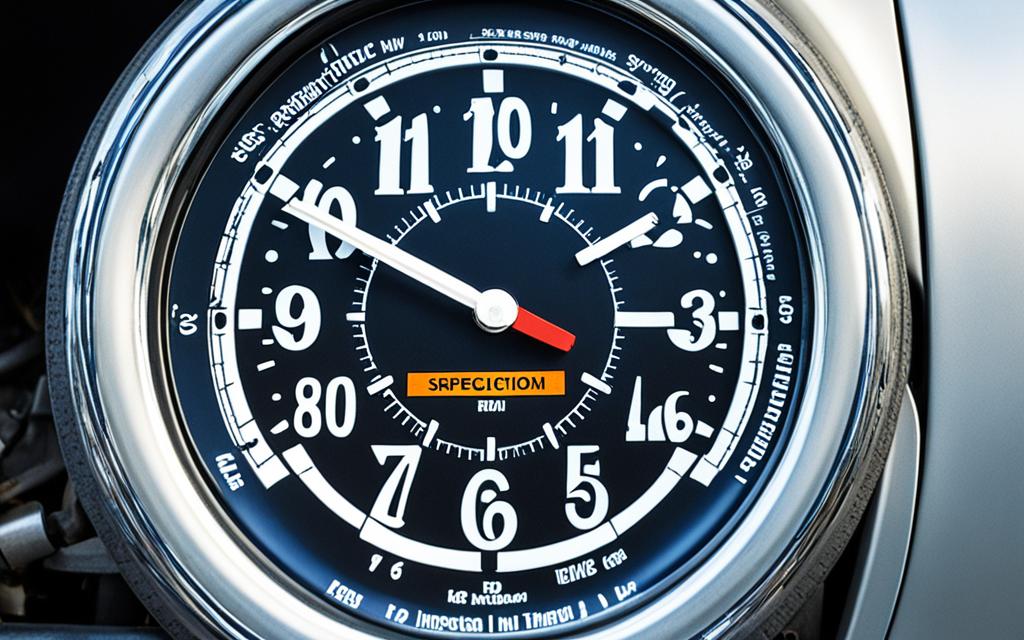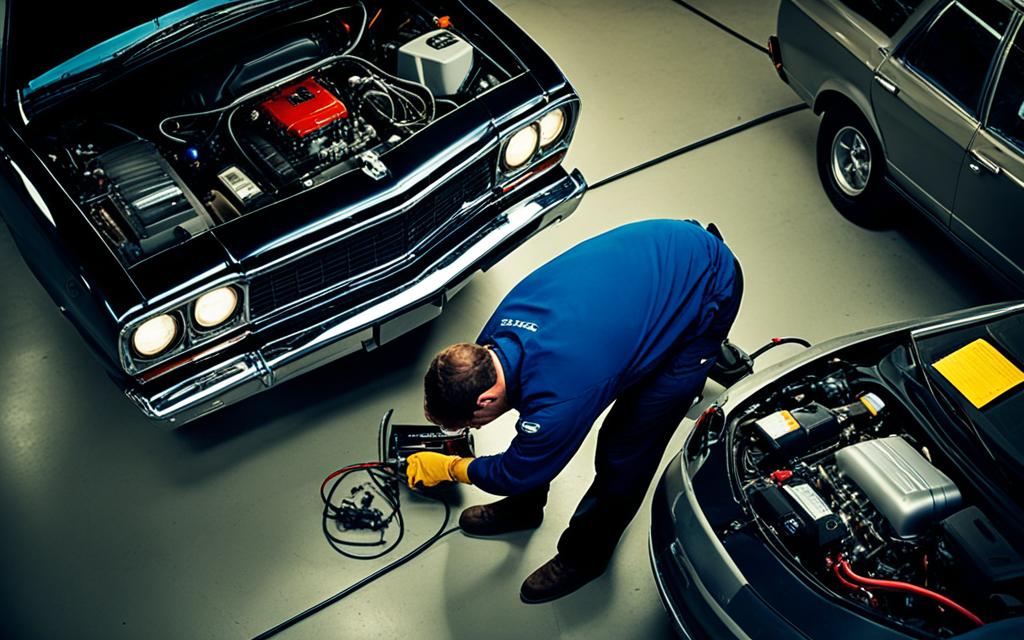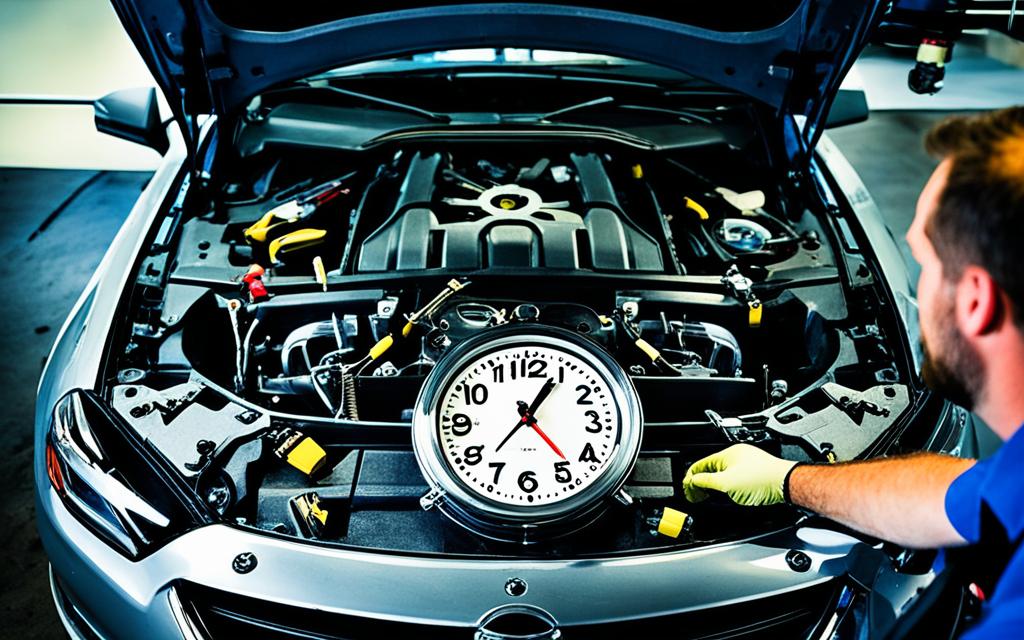Welcome to our article on car inspection duration! If you’re wondering how long a car inspection typically takes, you’ve come to the right place. Understanding the time frame involved in a car inspection can help you plan your schedule and ensure a smooth and efficient process. So, let’s dive in and explore the duration of a car inspection.
Key Takeaways:
- Knowing the duration of a car inspection helps with effective planning.
- Factors such as the type of inspection and the condition of the vehicle can impact the overall time required.
- A basic car inspection usually takes less time compared to a comprehensive inspection.
- Certain circumstances, like additional tests or repairs, may extend the inspection duration.
- Scheduling a car inspection in advance helps you allocate enough time for the process.
Factors Affecting Car Inspection Duration
Car inspections are crucial for ensuring the safety and roadworthiness of your vehicle. However, the duration of a car inspection can vary depending on several factors. Understanding these factors and their impact on the overall time required for the inspection process can help you better manage your time and plan accordingly.
Let’s take a closer look at some of the key factors that can affect car inspection time:
1. Type of Inspection
The type of inspection being conducted plays a significant role in determining the duration. Basic inspections, which typically involve checking essential components like lights, brakes, and tires, may take less time compared to comprehensive inspections that include additional tests such as emissions and mechanical inspections.
2. Vehicle Age and Condition
The age and overall condition of your vehicle can impact inspection time. Older vehicles or those in poor condition may require more thorough inspections, potentially leading to a longer duration.
3. Appointments and Workload
The availability of appointments at the inspection station and their workload can also affect the time required for the inspection. During busy periods, such as end-of-month or before holidays, the wait times for inspections may be longer.
4. Compliance with Regulations
If your vehicle does not meet the required safety and emission regulations, additional inspections or repairs may be necessary. This can extend the overall inspection time as the inspector addresses these non-compliance issues.
5. Inspector Experience
The experience and expertise of the inspector can also influence the inspection duration. Experienced inspectors are often more efficient in identifying and assessing potential issues, which can expedite the process.
It’s important to note that while these factors can impact car inspection time, the average inspection duration typically ranges from 30 minutes to 1 hour. However, it’s advisable to check with your local inspection station for more accurate estimates based on your specific circumstances.
Stay informed and prepared to make the most of your car inspection appointment.
| Factor | Potential Impact |
|---|---|
| Type of Inspection | Determines the scope of checks and tests, with more comprehensive inspections taking longer. |
| Vehicle Age and Condition | Older or poorly maintained vehicles may require additional inspections, resulting in a longer duration. |
| Appointments and Workload | Busy periods can lead to longer wait times and delays in scheduling appointments. |
| Compliance with Regulations | Non-compliance issues may require additional inspections or repairs, extending the inspection time. |
| Inspector Experience | Experienced inspectors can expedite the process through efficient identification and assessment of potential issues. |
Understanding the Car Inspection Process
Before delving into the duration of a car inspection, it’s crucial to have a clear understanding of the actual inspection process. A typical car inspection involves several key steps that assess the vehicle’s overall condition, safety, and functionality.
During the inspection, trained technicians thoroughly examine various components of the car, ranging from the exterior to the engine and everything in between. Each step of the process is aimed at ensuring that the vehicle meets the necessary standards and is safe to drive on the road.
Some of the common areas checked during a car inspection include:
- The body and exterior: This involves checking for any visible damage, rust, or areas that may indicate prior repairs or accidents.
- The tires and wheels: Technicians assess the tire condition, tread depth, and check for any signs of wear or damage. They also inspect the wheels for alignment and balance.
- The brakes and suspension: This step involves examining the braking system, including the brake pads, discs, and fluid. The suspension is checked for any signs of wear or potential issues that may affect the vehicle’s stability and ride comfort.
- The engine and fluids: Technicians inspect the engine components, including belts, hoses, and filters. They also assess the condition and levels of essential fluids such as oil, coolant, and transmission fluid.
- The electrical system: Various elements of the electrical system, including the battery, starter, and lights, are examined to ensure proper functioning.
- The interior: The interior inspection focuses on the functionality of essential components such as seat belts, air conditioning, heating, and entertainment systems.
It’s important to note that the time taken for each step of the inspection process can vary depending on factors such as the vehicle’s make, model, and overall condition. Additionally, any identified issues during the inspection may require further investigation, leading to additional time required for repairs or rechecking.
By understanding the various steps involved in a car inspection, vehicle owners can have a better idea of the time frame required for the process. In the following sections, we will explore the average time it takes for both a basic and comprehensive car inspection, providing more insights into the duration of this essential maintenance task.
Average Time for a Basic Car Inspection
When it comes to getting your car inspected, you may be wondering how long the process will take. On average, a basic car inspection can take anywhere from 30 minutes to 1 hour, depending on various factors. It’s important to note that this time frame may vary depending on the specific inspection requirements and the condition of your vehicle.
During a basic car inspection, a certified technician will perform a series of checks to ensure that your vehicle meets the necessary safety and emission standards. This may include examining the vehicle’s lights, tires, brakes, suspension, and exhaust system, among other components.
Here’s a breakdown of the average time it may take for each aspect of a basic car inspection:
| Inspection Aspect | Estimated Time |
|---|---|
| Lights and Indicators | 10-15 minutes |
| Tires and Wheels | 10-15 minutes |
| Brakes and Suspension | 10-15 minutes |
| Exhaust System | 5-10 minutes |
| Other Components | 5-10 minutes |
Keep in mind that these times are just estimates and can vary depending on the specific circumstances. Additionally, if any issues or concerns are identified during the inspection, additional time may be required to address and rectify them.
It’s always a good idea to schedule your car inspection in advance to ensure that you can allocate enough time for the process. This will help you avoid any potential delays or rush situations. By understanding the average duration and what to expect during a basic car inspection, you can plan your day effectively and ensure that your vehicle remains safe and compliant.
Time Frame for a Comprehensive Car Inspection
When it comes to a comprehensive car inspection, the duration can vary depending on several factors. In addition to the standard checks performed during a basic inspection, additional tests and examinations may be conducted to ensure a thorough evaluation of the vehicle’s condition.
On average, a comprehensive car inspection can take anywhere from 2 to 4 hours, although it’s important to note that this timeframe can be influenced by the complexity of the inspection process and the specific requirements of the vehicle.
Additional Checks and Tests
During a comprehensive car inspection, mechanics go beyond inspecting the basic components of the vehicle. They may perform additional checks and tests to assess specific aspects of the car’s performance, safety, and functionality.
These additional checks can include:
- Testing the electrical systems and components
- Examining the suspension and steering
- Checking the braking system
- Inspecting the exhaust system
- Evaluating the condition of the transmission
By conducting these comprehensive tests, mechanics can identify any potential issues that may not be detected during a basic inspection.
Complexity and Vehicle-Specific Factors
The complexity of a car inspection can also influence its duration. Some vehicles may have intricate systems or unique components that require additional time for evaluation. Additionally, the presence of modifications or aftermarket parts can impact the inspection process, as these may require further scrutiny.
Furthermore, the age and condition of the vehicle can affect the inspection timeframe. Older cars or those with a history of frequent repairs may require a more thorough examination, which can extend the overall duration of the inspection process.
Ensuring a Comprehensive Assessment

When scheduling a comprehensive car inspection, it’s crucial to allocate sufficient time for the examination. By allowing the mechanics to thoroughly assess the various components and perform any necessary tests, you can ensure a comprehensive assessment of your vehicle’s condition.
| Factors Impacting Inspection Duration | Estimated Time |
|---|---|
| Complexity of the inspection | Varies |
| Specific requirements of the vehicle | Varies |
| Presence of modifications or aftermarket parts | Varies |
| Age and condition of the vehicle | Varies |
Remember, a comprehensive car inspection ensures that every aspect of your vehicle is thoroughly examined, providing you with peace of mind and ensuring optimal performance and safety on the road.
Factors that May Extend Car Inspection Time
During a car inspection, certain conditions or situations can prolong the duration of the process. It’s important to be aware of these factors as they can contribute to a longer inspection time. Let’s take a closer look at some of the key reasons why a car inspection may take longer than expected:
- Vehicle Age and Condition: Older vehicles or those in poor condition often require more thorough inspections to ensure their safety and compliance with regulations. This additional scrutiny can extend the inspection time.
- Vehicle Modifications: If the car has been modified or altered in any way, it may require further examination to ensure compliance with regulations and safety standards. This can add extra time to the inspection process.
- Complex Systems and Features: Advanced technologies and complex systems present in modern vehicles may require more time for inspection, especially if specialized equipment or expertise is needed.
- Underlying Issues: In some cases, underlying issues or malfunctioning components may be discovered during the inspection, requiring further investigation and potentially leading to additional time for repairs or retesting.
- High Demand and Busy Schedules: Depending on the popularity of the inspection facility and its workload, there may be a backlog of appointments, resulting in longer wait times for inspections.
It’s important to keep these factors in mind when planning for a car inspection. While the duration may vary depending on the specific circumstances, being prepared for potential delays can help you manage your time effectively.
Did You Know?
Some inspections require additional specialists or equipment, which can further extend the time needed. For example, emissions testing may involve analyzing exhaust gases, which requires specialized equipment and expertise.
To give you a better understanding of the potential variations in car inspection time, here’s a table showcasing the average duration of inspections for different types of vehicles:
| Vehicle Type | Average Inspection Time |
|---|---|
| Passenger Car | 30 minutes to 1 hour |
| SUV/Truck | 45 minutes to 1.5 hours |
| Motorcycle | 15 minutes to 30 minutes |
It’s important to note that these times are just averages and can vary based on factors such as the condition of the vehicle, additional tests required, and the efficiency of the inspection facility.
Tips to Expedite the Car Inspection Process
If you’re looking to make the car inspection process more efficient and minimize the time it takes, here are some helpful tips and suggestions:
- Prepare your vehicle in advance: Before heading to the inspection center, make sure your car is clean, well-maintained, and free from clutter. This will help the inspectors easily access and examine the necessary areas without any delays.
- Organize your paperwork: Gather all the required documents, such as your driver’s license, vehicle registration, and proof of insurance, ahead of time. Having these documents readily available will save you precious minutes during the inspection process.
- Schedule an appointment: Many inspection centers offer the option to schedule appointments in advance. By booking a specific time slot, you can avoid long wait times and ensure that your inspection is conducted promptly.
- Choose the right time: If possible, try to schedule your car inspection during less busy hours. Weekdays early in the morning or late in the afternoon are often less crowded, allowing for a quicker inspection.
- Know what to expect: Familiarize yourself with the inspection requirements beforehand. Understanding what the inspectors will be looking for can help you address any potential issues ahead of time, minimizing the chance of re-inspection.
- Maintain your vehicle regularly: Regular maintenance and servicing can help ensure that your car is in good condition and meets the necessary safety standards. By taking care of minor repairs and maintenance tasks, you can avoid unexpected issues during the inspection.
- Communicate with the inspector: If you have any specific concerns or questions during the inspection, don’t hesitate to communicate with the inspector. Clear and open communication can help streamline the process and ensure that everything is addressed efficiently.
- Stay informed: Keep up-to-date with any changes in inspection regulations or requirements in your area. By staying informed, you can avoid any surprises and come prepared to the inspection.
Being proactive and well-prepared can significantly reduce the time required for a car inspection.
Following these tips can help expedite the car inspection process and save you valuable time. Remember, ensuring that your vehicle is in good condition and complying with safety standards is essential for your own safety and the safety of others on the road.

| Inspection Step | Estimated Time |
|---|---|
| Vehicle Documentation Check | 5 minutes |
| Exterior Inspection (Lights, Mirrors, Tires) | 10 minutes |
| Interior Inspection (Seats, Seatbelts, Controls) | 10 minutes |
| Under-the-Hood Check (Engine, Fluids) | 15 minutes |
| Vehicle Safety Features (Airbags, ABS, etc.) | 5 minutes |
| Diagnostic Scan (OBD-II System) | 10 minutes |
| Emissions Testing | 15 minutes |
| Final Review and Paperwork | 5 minutes |
Importance of Scheduling a Car Inspection in Advance
Scheduling a car inspection in advance is a smart move that can save you time and help you plan your day effectively. By booking your appointment ahead of time, you can ensure that the inspection fits seamlessly into your schedule without causing any last-minute rush or inconvenience. Let’s explore the advantages of scheduling ahead and the potential consequences of not allowing enough time for the inspection.
Advantages of Scheduling Ahead
When you schedule your car inspection in advance, you benefit in several ways:
- Convenience: By selecting a date and time that works best for you, you can avoid unnecessary waiting or delays at the inspection station.
- Availability: Booking in advance increases the likelihood of securing an appointment at your preferred inspection center.
- Time management: Planning ahead allows you to organize your day efficiently, ensuring you have enough time for the inspection without feeling rushed.
Whether you need the inspection for a specific purpose, such as renewing your vehicle registration or purchasing a used car, scheduling in advance helps you stay on top of your responsibilities.
Consequences of Not Allowing Enough Time
On the other hand, failing to schedule your car inspection with enough time can lead to various inconveniences:
- Limited availability: Without a prior appointment, you may find yourself at the mercy of wait times at overcrowded inspection stations.
- Increased stress: Waiting until the last moment can add unnecessary stress and pressure, especially if you have time-sensitive obligations.
- Potential delays: Without adequate time for the inspection, you risk delaying other activities or appointments in your schedule.
By allowing ample time for the car inspection, you can avoid these potential pitfalls and ensure a smooth and hassle-free experience.
Remember, scheduling your car inspection in advance is a proactive approach that allows you to take control of your time and responsibilities. Don’t wait until the last minute; book your appointment ahead of time for peace of mind and convenience.
| Advantages of Scheduling Ahead | Consequences of Not Allowing Enough Time |
|---|---|
| Convenience: Avoid unnecessary waiting or delays | Limited availability: At the mercy of overcrowded stations |
| Availability: Secure an appointment at your preferred center | Increased stress: Last-minute rush and pressure |
| Time management: Organize your day efficiently | Potential delays: Risk of delaying other activities |
Conclusion
In conclusion, understanding the duration of a car inspection is essential for efficient planning. By considering the various factors that can affect the inspection time, you can better prepare and ensure a smooth process.
Factors such as the type of inspection, the complexity of the vehicle, and the availability of necessary equipment and personnel can all impact the duration. Additionally, specific conditions or situations may extend the inspection time.
To expedite the car inspection process, it’s helpful to schedule your appointment in advance and arrive with all necessary documents and information. This will help minimize delays and ensure a timely inspection.
Remember, planning ahead and allowing sufficient time for the car inspection will not only save you from potential stress and last-minute rushing but will also help ensure the safety and efficiency of your vehicle in the long run.
FAQ
How long does a car inspection typically take?
The duration of a car inspection can vary depending on various factors, but on average, it usually takes around 1 to 2 hours to complete.
What factors can affect the duration of a car inspection?
Several factors can impact the time required for a car inspection. These include the type of inspection, the condition of the vehicle, the thoroughness of the inspection, and the availability of the inspection facility.
What happens during a typical car inspection?
During a car inspection, a trained technician will thoroughly examine various components of the vehicle to ensure that it meets safety and emissions standards. They will check areas such as the tires, brakes, lights, steering, suspension, and exhaust system.
How long does each step of the car inspection process take?
The duration of each step of the inspection process can vary, but typically, the technician spends around 20-30 minutes on visual inspections, another 20-30 minutes on mechanical inspections, and additional time on emissions testing if required.
How long does a basic car inspection usually take?
A basic car inspection, which includes visual and mechanical inspections, usually takes around 45 minutes to 1 hour to complete.
How long does a comprehensive car inspection take?
A comprehensive car inspection, which includes additional checks and tests such as emissions testing and diagnostic scans, can take anywhere from 1.5 to 2.5 hours to complete, depending on the complexity of the inspection and the equipment available.
What are some factors that may extend the duration of a car inspection?
Factors such as the need for repairs or replacements, complex diagnostics, a high volume of vehicles at the inspection facility, or waiting for certain test results can extend the duration of a car inspection.
Are there any tips to expedite the car inspection process?
To speed up the car inspection process, you can ensure that your vehicle is clean and organized, provide all necessary documentation, and communicate any specific concerns or issues to the technician beforehand.
Is it important to schedule a car inspection in advance?
Yes, scheduling an inspection in advance is highly recommended. It helps you secure a convenient time slot and allows you to plan your day accordingly. Walk-in inspections may have longer wait times or might not be possible if the facility is fully booked.








